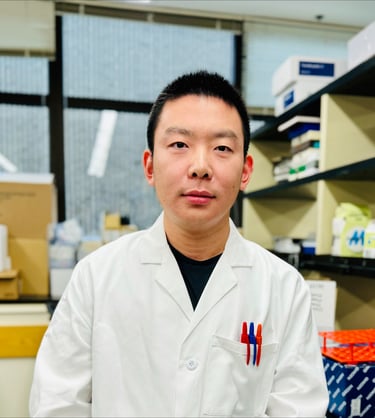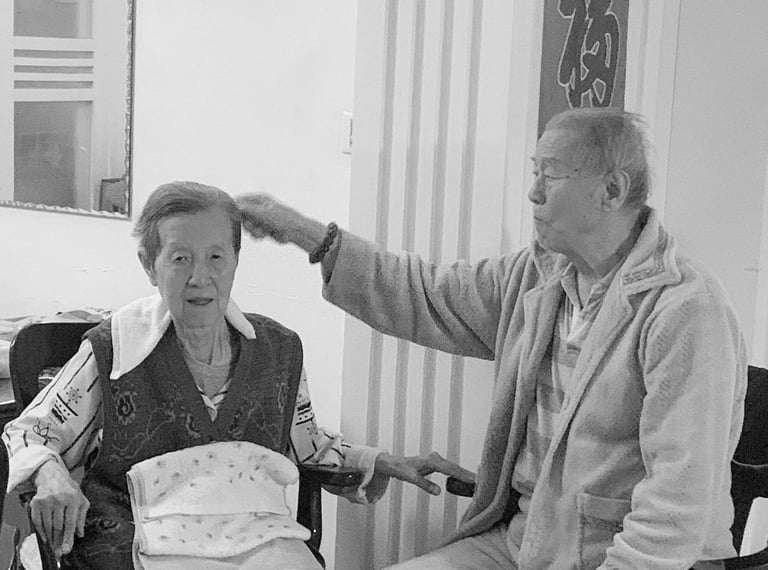

First things first: I know how frustrating it is to see a name and not know how to say it—so here’s mine: /tʃɪŋ:ü/ /lʊɒ/. My Chinese name means “to hold up the universe.” Some might say that’s too ambitious for a happy life, but I’ve always found purpose in it. To me, life is simple: move toward what is meaningful, and give it everything you’ve got.
I Didn’t Want to Be the Kind of Doctor Who Looks Into a Patient’s Eyes and Says, “There Is Nothing We Can Do.”
I went to medical school with a dream that many children carry: I wanted to save the people I loved. I was raised by the most wonderful grandparents in the world, and for as long as I can remember, I feared losing them. I thought if I became a doctor, I could protect them when illness came.
I enjoyed my time at medical school, learning how the human body normally functions and how diseases occur when something goes wrong. However, something happened during my final-year internship that completely changed the course of my life. I will never forget the look of despair on a gentlewoman’s face when she was told that nothing could be done to save her husband from late-stage lung cancer—just days after they had joyfully celebrated the New Year with their children. At that moment, I realized I didn’t want to be a doctor who simply delivers devastating facts. I decided to become a cancer biologist—someone who could uncover the mechanisms of this disease and, one day, help cure it.
Success in Science—But Still Too Far From Patients
I was fortunate to be admitted to the PhD program at Peking Union Medical College, the top medical school in China. Fueled by ambition, I threw myself into research—16 hours a day for five years. That dedication paid off: I led a subgroup and completed more than 10 basic and translational projects, identifying several promising new targets for cancer treatment.
This scientific success inspired me to pursue my academic path as a postdoc at Dana-Farber Cancer Institute, where I moved a project from the lab bench to a clinical trial and a publication in the world’s top scientific journal—all within four years. Eventually, I became a faculty member at one of the most prestigious medical schools in the world.
While everything seemed to be on a dream path, I was once stumped by a security guard late at night—we were the only two people still working in the building. He asked me, “Have you found a cure for it?” It was supposed to be a simple question. But it brought me back to the promise I made to myself ten years earlier. Wasn’t I doing all of this so that one day I could tell a cancer patient, I can help you? Could I do anything differently for that gentlewoman’s family from ten years ago? Sadly, the answer was no.
Bringing Science to the People Who Need It Most
Let’s be clear: I believe in the power of science. I believe that basic research and technological innovation are the engines of progress. But if 99% of cutting-edge discoveries never reach the people they were meant to serve, then we must ask—what are we doing wrong?
Today, precision medicine in clinical practice still largely depends on limited DNA testing of a few known genes, while in research labs, scientists are generating vast datasets using technologies like RNA sequencing and proteomics. Pharmaceutical companies are spending billions to develop drugs that might help a tiny percentage of patients—while the vast majority are still treated with chemotherapy regimens first derived from mustard gas in World War II.
It’s as if we have the capacity to build rockets to explore the moon—yet everyday people are still being handed a bicycle and told to outrun disaster. We can—and must—do better.
How We Are Utilizing Cutting-Edge Technology and Frontier Science to Build the Future of Patient-Centered Precision Medicine
That’s why I founded One Patient One Cure—to turn scientific potential into real-world solutions for patients, starting now.
We use artificial intelligence to integrate complex biological data—such as RNA and protein expression patterns—with drug response profiles from hundreds of cancer models. This allows us to predict which treatments might actually work for a specific patient, based not just on their cancer type, but on the unique biology of their disease.
We are also building drug sensitivity testing platforms where a cancer patient’s sample can be tested with the AI-predicted drugs in just a few days—so that prediction becomes validated truth. Doesn’t that sound like the way cancer should be diagnosed and treated?
The Mission of One Patient One Cure
We are leveraging the most cutting-edge technologies and scientific discoveries—but we are not a tech company aiming for billions in a founder’s pocket. We are a nonprofit organization with a long-term mission: to promote accessible and affordable precision medicine that could benefit everyone in the world. The coolest people doing the kindest work.
We believe that everyone—regardless of where they live or what background they come from—deserves a chance to benefit from the best that science has to offer.
Being at the Top of the Ivory Tower Didn’t Help Me Save My Own Families—But I Hope I Can Help Save Yours Someday
My childhood nightmare came true during my postdoc training in the U.S., when both of my grandparents passed away within a few years. The most ironic part was that, as someone at the very frontier of human scientific knowledge, I still couldn’t do anything to help them. When their health declined, I couldn’t even convince my parents to take them to the hospital—and I was trapped by the COVID travel ban. My family seemed to believe that at 80 or 90 years old, they were simply meant to fade away.
That was the moment I deeply realized that helping people understand the importance of seeking appropriate healthcare is just as vital as building advanced medical and scientific tools. And that’s exactly the other arm of One Patient One Cure’s mission: to educate the public about the importance of precision medicine and encourage them to engage in innovative medical approaches.
I wasn’t able to teach my own family how important it was to seek care. But I hope I can convince you of the importance of precision medicine. I’ve missed many chances to save individuals because the tools of personalized medicine weren’t accessible—but I hope that what we are doing at One Patient One Cure today might someday help your family.
Qingyu Luo, MD, PhD
Founding President of One Patient One Cure



